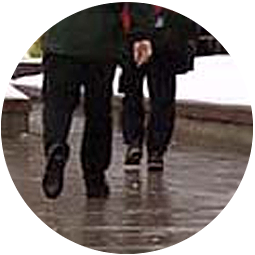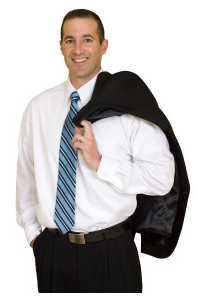Slip and Fall Accident Lawyer
Fall on Ice or Snow? Unsafe sidewalk or walkway? Unsafe steps or ramp? Construction or Workplace condition? Fall in a store?
 What can you do?
What can you do?
Get photos asap – this is critical. The property owner may change or fix the defect after your fall or slip. Pictures are key evidence for any personal injury slip fall case.
See a doctor asap for any symptoms or injuries.
Don’t give any statement or recorded interview to the property’s insurance company
If you were hurt at a business, ask that an incident report is done. If you haven’t done so already, request one or notify the manager or owner of your injury.
Follow any instructions from your doctor (don’t wait to do the follow-up treatment or visits). The insurance company for the property owner will try to use a gap in treatment against you
If you are unable to work, ask your doctor for a disability note
Find out if the insurance company for the property has “Med Pay” coverage (this is a separate coverage for medical bills)
Time is critical. Don’t let the property’s Insurance Company use it against you.
The insurance company handles injuries due to slip and falls every day. They will be gathering evidence, checking witnesses, getting photos. They may likely investigate you and your injury.
Many things need to be done in order to protect your rights to a claim. When you have an experienced injury lawyer that the insurance company respects, you change their leverage. They will take your claim more seriously. With two decades of experience and having worked in-house for defense law groups, we know what needs to be done for your case.
We know how they will try to defend the case and what they will use to try to avoid paying what the case is worth. Without a lawyer, the at-fault insurance company has you where they want you. We have successfully handled slip and fall injuries and falls on ice in both Pennsylvania State and Federal Courts.
This has included hiring expert engineers, architects, surveyors, and medical experts to prove the case. We have taken depositions of designated witnesses for the property owners and property managers in many cases, including complex ones, to obtain evidence. If you need an experienced personal injury lawyer for a slip or fall, we are ready to earn your trust. Contact us for a free, no obligation, evaluation of your case.
Falls on Ice or Snow
In Pennsylvania, there are three main types of cases due to a fall on ice or snow.
(1) Fall or slip due to a “natural accumulation” of snow or ice. This is where there were generalized wintry/icy conditions in the area. Here, this would be where there was a blanket of snow or ice where you fell. This type of case requires you prove that the property owner or manager or snow removal contractor allowed the snow or ice to pile up without timely shoveling, plowing, or adequately treating it with salt. This is also called the “hills and ridges” doctrine.
(2) Fall or slip due to an isolated patch of ice. This is where you fell on a patch of ice rather than a solid sheet of ice covering the entire area. The ice patch need not be the only patch of ice, but you do need to show that there wasn’t just a solid sheet of ice over the whole area. This could have been caused due to melt-refreeze conditions.
Pennsylvania Law requires that the property owner, manager, or snow removal contractor seek out patches of ice on the property and treat them with salt, cinders, ashes or other means. Other relevant information will be how long it had been since the last precipitation, what the temperatures were at the time of your fall and the previous hours before your fall. Of course, photos, if possible, are very important to help prove the condition. If you were not able to get photos, witnesses and weather reports are critical.
(3) Fall or slip due to ice which formed due to a defective condition. This is where a defect to the property caused the problem. Examples would be a leaky gutter, a drainage problem, or a hole or mis-leveled area that caused pooling of water or snow runoff that then froze.
The property owner, manager, or snow contractor has an obligation to salt or treat this area of ice where you fell. More importantly, where the owner or manager knew or should have known of the defect, they had a duty to fix or repair the problem.
Unsafe walkways and sidewalks.
Property owners and managers have a duty to fix or repair these problems. In your case, you will need to show that the defect, whether a mis-leveled area, a crack, or hole, was something that the property owner or manager knew or should have discovered. You would also need to prove the defect created an unsafe condition.
The insurance company for the property owner or manager may try to argue this was an “open or obvious” condition. This means they may try to blame you for your injury. The could argue that it was such an open or obvious defect that you were “comparatively negligent” for failing to look where you were going. You want to have someone get photos of the defect as soon as possible to prove what the defect looked like.
Unsafe steps or ramp.
Property owners are required to have safe steps. Was it a staircase? Did it have a railing? How high was the ramp? Why was the ramp there? There are different building codes and standards which may apply.
There may be lighting issues with the steps. An architect or engineer may be needed to report on the standards and whether they were met here. What type of treads, if any were on the steps? What were the height and width of the step where you fell? (Called the rise and tread). The type of building and use for the steps or ramp is also relevant. If it’s in an area of high traffic, or a place requiring workers or users to stand or reach for things, the standards may be different.
Construction or workplace condition.
You need to know whether the OSHA (Occupational Safety and Health Administration) rules apply. You may want to contact OSHA to request an investigation. You may be able to do that anonymously. An engineer or other safety experts may be needed in your case. That expert would report on safety standards and whether the property owner or manager met their obligations to keep the area safe where you fell. It may be difficult for you to get photos, but if possible you could try to have someone get photos. Be aware of whether you would be trespassing to do so.
You may want to request an incident report. If this was at a workplace, the employer may do a root cause analysis or an investigation. Keep in mind, those investigations often are biased due to the employer’s desire to show they did nothing wrong.
Note that in Pennsylvania, you cannot sue your employer for personal injury. But, if the unsafe condition was caused by or due to another party (for example an outside company that installed flooring, scaffolding, or steps), you have the right to bring a personal injury claim.
Fall in a store.
Stores have an obligation to keep their premises safe. What caused you to fall? If it was a wet floor or something that spilled, you have to prove that the condition existed long enough such that the Store knew or should have known of its condition.
If there was a defective condition such as a hole in the floor or parking lot, then you need to have someone get photos. You will want to notify a Store manager of your injury if you haven’t already done so. Be wary of giving statements. Often, Stores are aggressive in trying to get a statement, written or recorded, from you.
The Store will likely have a procedure manual or employee safety manual as well as procedures for inspections of the property. There may even be inspection logs or notes. These are key evidence. We work hard to obtain this evidence for you during the discovery process.
It will be important to locate any witnesses. Often employee witnesses are difficult because you can’t contact them directly and they are biased toward their employer for obvious reasons.
We have helped many clients for over 25 years, with Slip/Fall Injury cases from the following areas: Royersford, Collegeville, Limerick, Boyertown, Phoenixville, Pottstown, Gilbertsville, Douglassville, Schwenksville, Birdsboro, Chester Springs, Reading, Skippack, Norristown, King of Prussia, Montgomery County, Berks County, Chester County, Philadelphia County, Lancaster County, Delaware County and Eastern Pennsylvania. Free Consult, No Recovery, No Fee. Call (610) 792-3304








